Subscribe by Email
-
Recent Posts
Category Archives: Movies
Siracusa and The Girl on the Train
Well it’s been a fairly calm week. I am behind on carving pumpkins and getting the candy stocked for Halloween, but wait, there’s still time! The snow is gone here but most of the leaves are down. I raked them … Continue reading
Posted in Books, Movies
25 Comments
Book Festival Days and 3 Mini-Reviews
This past week I’ve been busy attending Wordfest, the annual weeklong book festival here. I went to eight events and heard more than 20 writers give readings and interviews. See authors: Peter Behrens, C.C. Humphreys, Steven Price, and Peter Robinson … Continue reading
Posted in Books, Movies
22 Comments
Snowflakes and Shrill
We had our first snow day on Friday, which is always a bit of a shock to a Californian living in Canada. On Thursday I had been out raking leaves for hours, which aren’t all down yet. Then Friday it … Continue reading
Posted in Books, Movies
26 Comments
The Girls and Our Kind of Traitor
A deluge of rain hit here this past week. In fact it’s been about three weeks of wet weather, and if I hadn’t had that trip to California earlier in July, I would’ve lost my mind by now. Where has … Continue reading
Posted in Books, Movies
18 Comments
Summer Days and Mini Reviews
I have been a bit AWOL from the Cue Card lately as I’ve had company in town and various gatherings, events, and chores. After all it is summer now, which is the busiest and best time of year here, especially … Continue reading
Posted in Books, Movies, TV
17 Comments
The Oscars, Americanah, and Wave
Thanks to those who commented last week about Harper Lee’s legacy and books; there was quite a good discussion with various excellent points raised. Now today is the Academy Awards, which has its share of controversy this year (or once … Continue reading
Posted in Books, Movies
25 Comments
The Last 5 Movies
This past week I’ve been enjoying David McCullough’s nonfiction book “The Wright Brothers” and Sarah Waters’s novel “The Paying Guests” and will report back once I finish both. Have you read these? Meanwhile over the past few months I finished … Continue reading
Posted in Movies
20 Comments
My 2015 in Review
Looking back on 2015, I had quite a good reading year. While my stats below don’t seem that impressive, I was happy with the quality of books and the array of literary gems I found. I’ve never been a speedy … Continue reading
Posted in Books, Movies, Music
23 Comments
The Transcriptionist and Movie Briefs

Well winter has fully arrived today as it’s 10 degrees Fahrenheit out with a wind chill of -3. Ouch. They say this “Arctic blast” should be over by tomorrow though. We have about five inches of snow on the ground. My dog loves it of course and still wants her long walks, sigh. It’s okay though because next week we’ll be celebrating the Christmas holiday with family in Southern Cal, enjoying balmier temperatures.
My reading has taken a hit this month as the Christmas season has prevailed over all things. Though Ti over at Book Chatter and I are doing a read-along of F. Scott Fitzgerald’s 1934 novel “Tender Is the Night.” I’m struggling a bit with it and trying to hang on to the story of Dick and Nicole Divers set amid the French Riviera and Switzerland. Perhaps they’re a kind of flip side to Jay Gatsby and Daisy Buchanan. Of course Ti has zoomed through the novel and is done, waiting to discuss it. I will see “Tender Is the Night” through or else be damned.
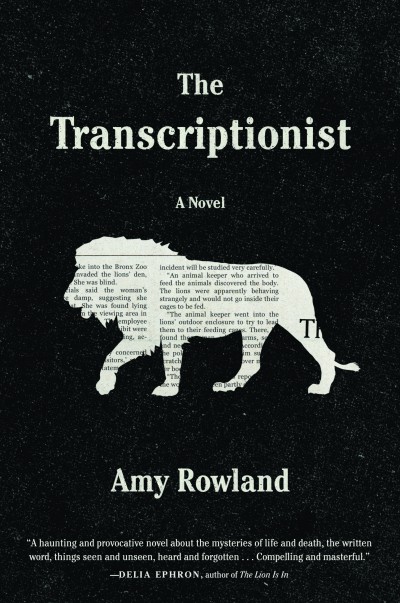
Meanwhile I continue to have good luck with audiobooks from the library, which I listen to while on my frozen walks with my dog. I finished the audiobook of Amy Rowland’s 2014 debut novel “The Transcriptionist,” which I very much enjoyed. It’s about 33-year-old Lena, who works as a transcriptionist for a big NYC newspaper called The Record. She sits alone in a room all day with a headset and Dictaphone transcribing stories from reporters out in the field — until one day she comes across a story so shocking that it gets under her skin and eventually unravels her world.
Wow, this little gem of a novel is both funny and heartfelt, though dark too. It’s apparent from it the author worked at a major newspaper and indeed she was a transcriptionist at the New York Times for a few years from 2001, before transferring to the book review section. Like the character Lena, she sat in a room transcribing the words from reporters’ calls and tapes. I remember those days, now obsolete, when I was at The Post. So old school but good. Funny to think back on the by-gone newspaper days when transcription and newspaper paste-up and typesetting were commonplace.
In “The Transcriptionist” the author nails the experience of a low-life newspaper employee and how the job and the tragic stories she transcribes begin to fray her soul. The other newsroom employees she comes in contact with are wonderfully drawn and caricatured. In time, Lena plays her card at the paper, which has its consequences, but not before raising ethical journalistic infractions going on there.
The book rang true for me, which was cool. You don’t necessarily need to have been at a newspaper to be engaged by “The Transcriptionist,” but it’s sort of a kick if you have. Anyone might like how the novel touches on themes of the written word, isolation, technology, ethics, and the discontentment with a job.
This audiobook was expertly narrated by Xe Sands. One sign of a good audio is that you want to read the print version as well soon afterwards, and you likely want a copy of the book for your shelves too. So far, I can say that about “The Transcriptionist” and “Station Eleven.”
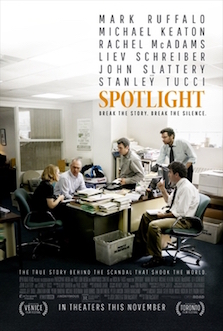
As for movies, the husband and I saw “Spotlight” about the Boston Globe’s 2002 uncovering of the sex abuse scandal of minors by priests and the cover-up within the local Catholic Archdiocese. It’s hard to turn investigative newspaper stories into dynamic movies but the screenwriters pulled this one off. It’s a powerful rendering of the explosive scandal and focuses on how the journalists pieced the story together. The cast is superb, and the victims stories are horrific (a couple cases are briefly described, the rest implied). It’s hard to fathom the scale of the abuse and the cover-up even now long after it’s been made public.
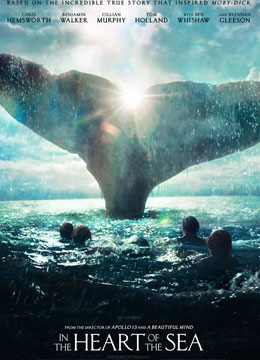
We also just saw the movie “In the Heart of the Sea” about the sinking of the whaling ship (Essex) in 1820 by a giant whale. Much of the movie focuses on the captain and the first mate (played by the hunky Chris Hemsworth) who don’t see eye-to-eye over the ship’s destination or seamanship — and how the ship’s surviving crew are pushed to the brink to stay alive. We liked the film, though it received just a 41% favorable critic rating on Rotten Tomatoes. It deserves better! Be forewarned: it’s not easy to watch majestic whales being hunted and killed, but it’s hard to deny whaling was a considerable part of U.S. history. The film’s visual effects may seem unreal at times, but the story of the real-life maritime disaster is well worth seeing, as well as for its role in inspiring Herman Melville’s epic “Moby-Dick.” Melville, played by British actor Ben Whishaw, has an interesting part in the movie.
What about you — have you read “The Transcriptionist” or seen the movies “Spotlight” or “In the Heart of the Sea” — and if so, what did you think?
Till the next time, have a happy holiday season!
Continue reading
Posted in Books, Movies
24 Comments
The Secret River and Week’s Review
For those in the U.S., Thanksgiving is nearly here so I’m wishing everyone a very happy turkey day in advance. My husband and I usually do not travel for Thanksgiving but this year we are going to San Francisco for a rare family get-together at my sister’s. I think 15 relatives or so will be there, which is pretty exciting. What are you doing for Thanksgiving?

Meanwhile this week I finished Australian author Kate Grenville’s 2005 novel “The Secret River,” which is set during the early 1800s about an English bargeman, William Thornhill, who is deported (for stealing) along with his wife to the colony of New South Wales in what later would become Australia. After a few years, Thornhill’s pardoned and settles with his family fifty miles beyond Sydney on the frontier — with dreams of owning his own farm land along the banks of the Hawkesbury River. The only problem is the land has long been the territory of an Aboriginal group that uses the land as well. A culture clash between the settlers and the natives ensues with the hostility gradually escalating until one final act ends up changing all of their lives forever.
What starts out as a pretty measured-paced novel builds to a crescendo toward the end. Grenville is quite a gifted storyteller and I felt in “The Secret River” she captured the sensibilities of the characters, the densely forested landscape along the river, and the settler-Aboriginal conflict very well. It was like I was on the edge of the Australian frontier in 1814 with circumstances and the heat about to boil over — the wife wanting to return to England, Thornhill wanting to stay, and the other settlers pushing to settle things with the natives once and for all. I credit Grenville for writing such a well-researched historical novel that flows so easily; she definitely seems to be a born storyteller. Apparently, according to Wikipedia, “The Secret River” was inspired by Grenville’s interest in finding out about an ancestor of hers who settled along the Hawkesbury River, and it took her five years and twenty drafts to complete. Oh my, no wonder the novel turned out right.
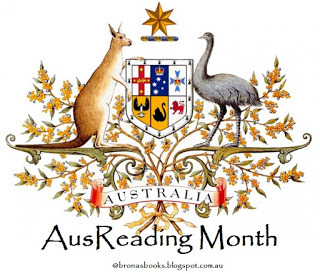
I read “The Secret River” as part of AusReadingMonth, which is being hosted by Brona at Brona’s Books. She helped pick out this novel for me and I’m glad because it seemed right up my alley. I’ve read a lot of fiction by Australian author Tim Winton but never had read Grenville before. “The Secret River” is the first novel in a trilogy and I’m interested in reading the other two books about the Thornhill family. From the first one, I could visualize Australia so well even though I’ve never been there, but I sure would like to go. I meet quite a few Aussies here in Western Canada — as the people of the Commonwealth countries sure seem to keep together.
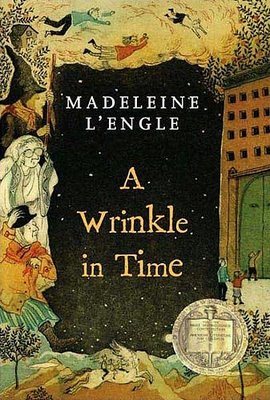
In other news last week, I finished the audiobook of Madeleine L’Engle’s 1962 children’s classic “A Wrinkle in Time.” I had not remembered the fine details of the book from my youth so I returned to rectify that. I’m so glad I did. I really enjoyed listening to the story of Meg and her younger brother Charles Wallace (who can forget Charles?) as they journey along with schoolmate Calvin O’Keefe to find their missing father, a scientist who had been working on fifth dimensional time-travel before disappearing. I loved the trio of their helpers: Mrs. Whatsit, Mrs. Who, and Mrs. Which, and was appropriately intimidated by the dark planet of Camazotz and the disembodied brain that controls the place. Blech! Run Charles Wallace, Run! Luckily Meg seems to learn some valuable lessons about fighting conformity and evil along the way. I listened to the audiobook narrated by actress Hope Davis that came out with the 50th anniversary edition a few years ago. I highly recommend Hope’s reading of “A Wrinkle in Time.” It’s good fun.
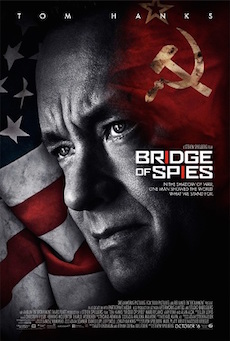
Also my Hub and I finally saw Steven Spielberg’s Cold War film “Bridge of Spies” last week. It has all the historical intrigue and ingredients to be quite fascinating — and it is to a certain extent. It’s about an American lawyer trying to get back a captured U.S. spy pilot in a prisoner exchange with a Soviet spy. The movie is good, but in some respects “Bridge of Spies” seems to come across a tad dry (I think from the script) despite how much tension and anxiety you would think such circumstances would involve during the Cold War. The movie is definitely worth going to — it’s quite an interesting event in history. I just felt it could’ve had more intensity or pulse to it (instead there is a bit of Coen Brothers’ humor in there). For goodness sakes, world annihilation was on the line.
Lastly in news, congratulations to last week’s National Book Award winners: Adam Johnson for his short story collection “Fortune Smiles” and Ta-Nehisi Coates for his nonfiction book “Between the World and Me.” I haven’t read either author just yet, but I have their books on my radar. Both seem quite thought-provoking.
How about you — have you read any of these books mentioned above or seen the Spielberg movie — and if so, what did you think? Continue reading
Posted in Books, Movies
33 Comments
